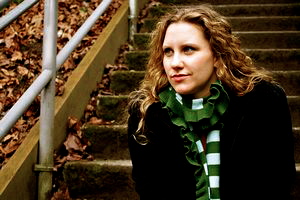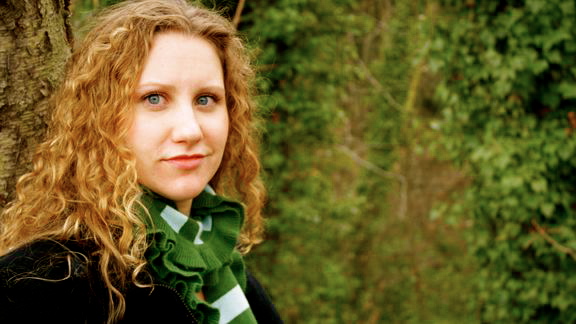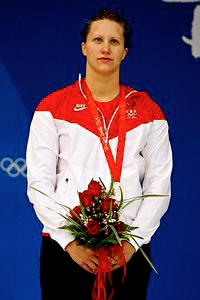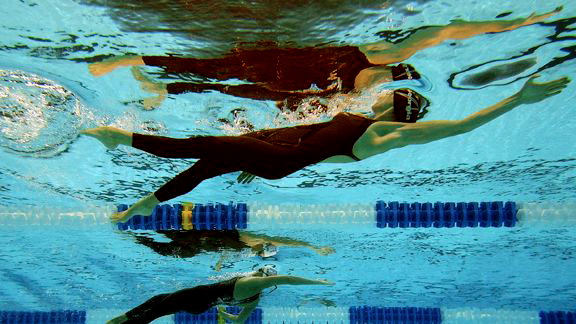Olympian Speaks of Child Sexual Abuse
One of the most heart wrenching aspects about directing Made in His Image is reading the hundreds of emails I receive that express a sense and belief of worthlessness coming from the writer. Often times, this sense of hopelessness is related to their past traumatic experiences – specifically abuse.
Women tell me, “If I talk about it, or cry, I’m weak.” This is probably one of the biggest misconceptions in regards to abused victims. Today, Made in His Image welcomes a very special post – the story of Margaret Hoelzer, The U.S. record holder in the 200-meter backstroke. I challenge anyone who says Margaret is weak.
Please believe me when I tell you from the deepest depths of my heart that you are NOT worthless! You are precious. And I know it doesn’t feel like you are, but you must cling to hope for your healing and freedom. I can’t wait for you to read my book – Choosing to See Beauty. I wrote it just for this reason. I’ve been where you are tonight, I know how you feel and my life is a testimony to healing found in the Father. His healing is for you too. Always HOPE!
The wallpaper border was meant to be peaceful, serene. A soft shade of blue covered with images of rose-colored flowers and white lattice. It was supposed to ease the nerves and bring a sense of calm to the bedroom. But with each piece that Margaret Hoelzer and her mother stuck to the wall that afternoon, the more secrets that came spilling out. The more the meaning of that border changed.
“I was paralyzed. It was like I was in a tunnel,” said Margaret’s mother, Elizabeth Livingston. “And I just kept praying to God to give me the strength to get through this and give my daughter the strength to keep talking.”
It was any parent’s worst nightmare. Ten-year-old Margaret began telling her mom how, between the ages of 5 and 7, she thought she might have been sexually abused by the father of one of Margaret’s friends. For three hours Margaret kept talking, telling of how the man touched her here, lured her there. He had shown her adult magazines and exposed himself to her. She spoke with a level of detail and knew things about the male anatomy that a 10-year-old girl simply shouldn’t know. Her mother was horrified.
Beginning that March afternoon in 1994, life would never be the same. Margaret would hide in the closet every time her mom left home. She lost any sense of self-esteem. She lost her trust in people — to the point that she wouldn’t kiss a boy until 10 years later and even now, at the age of 25, has still never had a serious boyfriend.
“Sexual abuse is like a disease,” Margaret said. “It just attacked my self-esteem. My first lesson that not all people are good, that adults aren’t perfect and don’t always have your best interests at heart? Yeah, I learned that at 5 years old. And that just kills any trust you have in the world.”
Fifteen years after that afternoon in her mom’s bedroom, Margaret Hoelzer is at the Water Cube in Beijing, a third Olympic medal draped around her neck. The world doesn’t know what she’s been through, doesn’t know the demons she’s fought to get here. Margaret believes the time has come for it to find out. After all, this has been the plan since she was 11, since the day a grand jury decided there wasn’t enough evidence to pursue a case. The jurors told her it didn’t mean they didn’t believe her, it didn’t mean that nothing had happened. It just meant they couldn’t prove it. But try telling that to a fifth grader who lives in a world where you do something wrong and you’re punished.
“I was devastated,” Margaret said. “The pain was immense. And I remember thinking that I don’t ever want anyone else to have to go through that feeling of helplessness. That was when I began to realize, if the timing was ever right, if I could ever help someone else, I was going to tell my story.”
The nightmare
Margaret Hoelzer is comfortable. She’s wearing her favorite jeans, sitting in one of her favorite Seattle restaurants and eating one of her favorite dishes — a crepe stuffed with egg, tomato and spinach. She smiles, she laughs. And with every move, her curly blonde hair bounces up and down and her baby blue eyes jump in and out of the restaurant light.
But with one question, everything changes. Her voice turns robotic. Her eyes go hollow. Her hair stops bouncing. Her words sound as if they’re coming out of a machine, absent any feeling. It’s a defense mechanism, she says, the only way she can talk about what happened without emotionally collapsing. She takes a deep breath and begins.
“It was a friend’s father,” she says. “There were several incidents.”
The U.S. record holder in the 200-meter backstroke starts with the night she slept at her friend’s house and heard the door creep open in the middle of the night.
She says the abuse eventually stopped when the alleged attacker and his family moved to another town. Hoelzer has not seen or heard from the man or his family since. She denied repeated requests to name her alleged attacker. A spokesperson from the Madison County (Ala.) District Attorney’s Office confirmed that there was a case involving Hoelzer in 1994, but could not provide additional details, citing child abuse privacy laws.
“It’s never been about him,” Hoelzer said. “It’s never been about seeing him or screaming at him or getting some sort of revenge. I’ve tried to focus my energy on myself.”
Hoelzer said she didn’t begin to grasp the severity of what happened until she confided in a friend just before her 11th birthday. The friend insisted she tell her mom, then Hoelzer met with the Huntsville Police Department and the National Child Advocacy Center, which is in Huntsville. A psychologist told Hoelzer she was likely being groomed for rape and that her outgoing, chatty personality probably saved her. Suddenly, the what-ifs terrified the girl.
“Sure, I was being told this as a ‘thank God, you’re so lucky, you’re one of the lucky ones,'” she said, “but at the same time, once I realized the seriousness of what could have happened, the fact that I might not have been able to have kids and all that, it was like … oh … my … God. I was absolutely terrified.”
A lack of trust
At 5 years old, life lessons are simple. Be polite, mind your manners, don’t talk with your mouth full, respect your elders. Adults are always right. Do what they say. Don’t talk back. Trust.
For 11 years, Margaret Hoelzer lived in the trusting world, trusting adults. After she told her mother she had been molested, and she grasped how close she was to being raped — as a first grader — that sense of security was ripped from her. She lost her self-esteem. She lost her sense of control. She lost her trust in the world.
“I had to teach her at an early age that not all adults are right, that trust is something that is earned,” said Margaret’s mother, Elizabeth. “And that just ripped away her innocence. And you can’t put a Band-Aid on that and fix it.”
Everywhere her mother went, Margaret had to be by her side. If her mom was upstairs putting away laundry, Margaret was there. If Elizabeth was downstairs cooking dinner, Margaret was there. A psychologist suggested that Elizabeth walk the family dog for 10 minutes a day, hopefully teaching her daughter it was safe for an 11-year-old girl to be home alone for a few minutes. But the moment her mother left, Margaret panicked, hiding in her bedroom closet.
“Those were some of the worst 10 minutes of my life,” Margaret said. “This is at like 3 o’clock in the afternoon, it’s a sunny, beautiful day, my mom walks the dog for 10 minutes and I am absolutely horrified.”
Margaret eventually grew comfortable with being left home alone. But it took time. She wasn’t able to live alone until last year. And even then, upon purchasing her first home, the deciding factors weren’t a spacious bathroom or an open floor plan, but rather a home that had no porch, no patio and only one door. She’s still “anal retentive” about locking doors, even locking her house every time she goes to get the mail.
But there is perhaps no part of her life that has caused Hoelzer more anxiety than relationships. The outgoing, engaging woman will turn 26 later this month and has never had a serious boyfriend. She didn’t even kiss someone until she was 20. In high school it wasn’t a big deal, she said. But once she got to Auburn, she realized she was different. Her friends started dating; Hoelzer was nervous even talking to a guy.
“We would all be sitting around talking about the things girls talk about and I was so uncomfortable, so self-conscious,” she said. “Half of my friends weren’t even virgins. And not only had I never done that, but geez, a kiss? What is that? Like the ‘pre-base’? If first base is being felt up, then kissing is before you even get up to bat. I mean, how am I supposed to hit a home run if I hadn’t even gotten out of the dugout?”
Hoelzer’s relationship issues were one of the reasons she returned to counseling two years ago. She’s liked boys, had huge crushes, but has never been able to overcome her emotional issues to pursue a relationship. In counseling, she learned that part of her problem is a lack of trust in men, part of it is a fear of vulnerability and part of it is trying to overcompensate for a feeling that her alleged attacker didn’t care about her.
She’s realized that one of her defense mechanisms is pursuing men who are unavailable. She’s also learned about her tendency to ignore a man the instant she thinks he might have an interest in her. It’s all her wall of defense.
“Basically, when you’ve been abused, you usually go either the promiscuous route or the nun route,” she said. “I went the nun route. I was scared of anything that had to do with any of that. For me, sex was so special and so sacred that I wouldn’t go anywhere near that until I was completely in love with someone. And I wouldn’t let that happen. So I avoided anything and everything that came with it.”
Hoelzer now believes she is as open to a relationship as she has ever been, despite her trust issues. Her deepest fear, she says, is the potential failure of her sixth sense, that intuition that subconsciously saved her when she was a little girl. What if she senses that a man is safe to open up to but she later finds out otherwise?
“That’s been the defense mechanism that I’ve used my entire life,” she said. “It saved me as a little girl and it’s saved me as an adult. So my fears are much greater than being rejected. It’s the fear of what will happen if the only defense I have against the world no longer works.”
Going public
Two days after her second-place finish in the 200-meter backstroke final in Beijing, Hoelzer and her two closest friends stand at a crossroads. While visiting the Great Wall of China, they can’t decide which path to follow. To the left: the more challenging, more strenuous but more rewarding trail. To the right: the smoother, flatter, easier route that most everyone seems to follow.
The Olympian and her friends veer to the left. Along the way, Hoelzer tells them she’s ready to share her story. All her life, this has been the plan. Achieve Olympic glory, give herself a platform, then tell what happened in the hope of raising awareness about child sexual abuse.
The pool has always provided escape. There, she has had control. She has had success. She’s never had to rely on anyone else, be it a teammate or a judge. It’s always been her, the water and the clock. It’s fitting that she would use her salvation — swimming — to try to help others.
“Swimming helped give me self-esteem,” she said. “A lot of athletes compete because they want to prove they are better than the average person. I always felt I had to prove I was as good as everybody else. My accomplishments brought me back up to normal.”
Said Elizabeth: “Swimming has been a godsend. I truly believe that she was given this gift for a purpose. She always said, ‘If I ever make the Olympics, if I’m ever in that position, I want to help others.’ This was always her motivation. This was always what she worked so hard for.”
Hoelzer knows the statistics are staggering. According to the American Academy of Pediatrics, 1 in 4 girls and 1 in 8 boys will be sexually abused before their 18th birthday. One in 20 children will be sexually abused each year. And an estimated 40 million survivors of childhood sexual abuse live in America today. Yet it’s a taboo topic. An estimated 30 percent of all incidents never go reported.
“It happens. It happens so much more than people realize,” Hoelzer said. “It happens 40 to 50 times the rate of childhood cancer. And with all due respect to childhood cancer, that’s easier to talk about than someone being molested. People can’t even say the word, ‘molested.’ I want to change that.”
As much as she didn’t want to tell what that man allegedly did to her, as much as she didn’t want anyone to know she didn’t kiss a boy until she was 20, Hoelzer wanted to help. She believed that if her story could inspire one child or even one adult, it would be worth her anxiety.
So last September, a few weeks after returning from Beijing, Hoelzer sat down with a reporter from The Associated Press and told her story. It wasn’t easy. She broke down in tears several times. And deep inside, she wondered: What if nobody cares? What if nobody listens? And on a smaller scale, how in the world would she get a date now?
“I honestly worried about that,” Hoelzer said. “I mean, it’s hard enough for relationships to work for ‘normal people.’ What guy would even want to date some nutcase who has all these trust issues?”
Setting herself free
 In the months since she told her story, life has gotten easier. The woman who pushed herself in the water, setting the goal of winning a gold medal in world-record time so that she could have the platform to tell her story, no longer feels the burden of swimming under such pressure. She no longer melts down when she fails to meet her lofty expectations. She’s learned that a gold medal isn’t everything. A world record isn’t everything. The hundreds of letters, e-mails and phone calls from friends and strangers all across the world have proved to her that two silver medals and one bronze provide a pretty nice platform, as well.
In the months since she told her story, life has gotten easier. The woman who pushed herself in the water, setting the goal of winning a gold medal in world-record time so that she could have the platform to tell her story, no longer feels the burden of swimming under such pressure. She no longer melts down when she fails to meet her lofty expectations. She’s learned that a gold medal isn’t everything. A world record isn’t everything. The hundreds of letters, e-mails and phone calls from friends and strangers all across the world have proved to her that two silver medals and one bronze provide a pretty nice platform, as well.
“She has overcome more than just about any other swimmer on the Olympic team to get where she has,” Marsh said. “These demons have absolutely held her back. How could they not? But now, feeling like she can be open and vulnerable as a human being? How could that not help her? How could that not set her free to reach her fullest potential?”
Going public is only the beginning of Hoelzer’s plan. She majored in criminology and sociology at Auburn and wrote college papers on child abuse. She plans to someday work in the field and also would like to start a foundation that would financially support the National Children’s Advocacy Center. One of her goals is to increase awareness of the signs parents should look for if they think their child has been abused.
“She’s incredible, just an absolute inspiration,” says Catherine Hereford, the development director for the NCAC. “She sees that she has a platform and is using that for absolute selfless good. Personally, I can’t imagine telling the world something so personal and private.”
A week after Hoelzer’s story appeared on The Associated Press wire, she stood before some 500 people and spoke at the principal fundraising banquet for the NCAC in Huntsville. The woman who doesn’t get nervous before races, who’s never had a problem with public speaking, talked about the team that helped her reach their shared goals in Beijing. She talked about family, friends, coaches and nutritionists. And she talked about the Advocacy Center, the people who helped her find her way through the darkest part of her life.
That’s when it hit. That’s when even the greatest defense mechanisms in the world couldn’t hold back the tears, couldn’t keep Hoelzer from stepping back from the microphone.
As she gathered herself, the audience came to its feet and applauded.
“I couldn’t help but stand there and think, ‘That’s my little girl up there,'” Elizabeth said. “That’s my little girl telling the whole world about her nightmare, just so she can help other people. This is greater than anything she could ever accomplish at any Olympics. She is showing the world that no matter what obstacles you have to overcome, you can still chase that dream. You can still have hope. She’s truly an inspiration.”
Wayne Drehs is a senior writer for ESPN.com. He can be reached at [email protected]. For the complete article click here.






